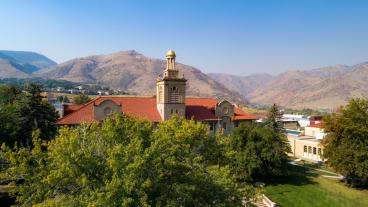Colorado School of Mines part of multi-university team selected by DoD for social science research
Mines' Morgan Bazilian and Mark Deinert will be contributing to research on critical minerals, battery technology, and reducing dependence on hostile suppliers in the clean energy supply chain
U.S. Naval War College, University of Texas and Colorado School of Mines have been selected to research critical minerals, battery technology, and reducing dependence on hostile suppliers in the clean energy supply chain.
Principal investigators from each institution include Professor Joshua Busby, LBJ School of Public Affairs and the Strauss Center for International Security and Law, University of Texas, Austin; Professor Emily Holland, U.S. Naval War College; and Professors Morgan Bazilian and Mark Deinert, Payne Institute for Public Policy, Colorado School of Mines.
The DoD announced the selection of six DoD and university faculty teams to pursue fundamental social science research through the Defense Education and Civilian University Research (DECUR) Partnership, a program under DoD’s Minerva Research Initiative (Minerva).
The clean energy transition will be minerals and metals intensive. Currently, supply chains are overwhelmingly reliant on imports from China. Given rising geo-strategic tensions between the U.S. and China, that dependence has potentially troubling implications for U.S. national security.

“Critical minerals are essential not only to future energy systems but also to defense,” said Morgan Bazilian, director of the Payne Institute. “Exploring the complex supply chains and details of military demands for these materials will help ensure a robust response to national security.”
To understand whether and how such dependence might create national security risks requires an exploration into the nature and extent of likely future demand for and supplies of raw materials as the scope and scale of demand for batteries and other critical components increase.
"I'm delighted to work with colleagues from the U.S. Naval War College and Colorado School of Mines on this project,” said Busby. “Critical minerals and the wider battery supply chain are increasingly important in the clean energy transition. We hope this project will contribute to a better understanding of the intersection of minerals and batteries with U.S. national security."
Although metals and minerals have different properties from liquid fuels, it is an open question whether they can be used as coercive foreign policy tools or if import dependence for critical minerals has other national security risks. The control of energy supplies was the basis for the 1973 oil crisis and is currently causing significant global shifts as a result of Russia’s invasion of Ukraine.
“Energy security is one of our nation’s most important strategic challenges,” said Holland. “We hope that our research will improve our understanding of the intersection between technological advancement and energy security and bolster U.S. national security.”
The project aims to ask more foundational social science questions because of the current U.S. efforts to diversify its supply chains for these materials. The project will use two roundtable workshops to collect state-of-the-art social science-informed approaches to modeling and understanding these questions. Workshops will include experts from academia, security and policy institutions where papers will be presented and discussed. After each workshop, a report will be produced that summarizes collective findings and identifies potential research gaps and promising approaches. The third component will be a table-top exercise (TTX) where participants will role play a major supply disruption to the battery and metals supply chain. The TTX will produce a summary report and brief for a wider policy audience.

“One hundred years ago, manufacturing and defense relied on a dozen or so materials,” said Mark Deinert, a Payne Institute fellow and associate professor of mechanical engineering at Mines. “Now, much of the entire periodic table comes into play with countries working quickly to ensure their access to key resources.”
DECUR aims to develop collaborative relationships between Defense Professional Military Education (PME) institutions and civilian research universities to improve national security-relevant basic social science research, train future military leaders in social science methods, enhance scientific cooperation between civilian and military educational institutions, and ultimately better inform DoD policymakers’ understanding of the social and cultural forces shaping U.S. strategic interests globally.
More information on this DoD initiative can be found here.




